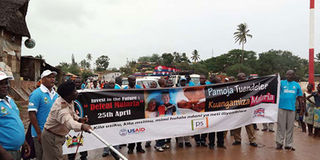Malaria treatment should be prioritised

World Malaria Day is celebrated in Kaloleni, Kilifi County, on April 26, 2015. PHOTO | FILE | NATION MEDIA GROUP
What you need to know:
- It is even more crucial that children with fever be tested for malaria. Children are a high-risk population prone to severe complications.
- In the interim, countries should consider stockpiling supplies of malaria rapid diagnostic tests, treatment and essential control commodities.
Ridding the world of malaria in the near future is a very ambitious goal.
Efforts to achieve it have already been weakened by governments shifting resources from malaria control to the fight against Covid-19.
Those efforts were recently dealt another blow. Catharina Boehme, chief executive of the Foundation for Innovative New Diagnostics and adviser to the World Health Organisation, reported that financial incentives have encouraged many companies to downscale, or even stop, the production of tests for a number of infectious diseases, including malaria, to focus on the mass production of tests for Covid-19.
This decision could erode the gains made against malaria over the past 20 years. The widespread deployment of malaria rapid diagnostic tests, particularly across Africa, expanded access to prompt, quality diagnosis.
This enabled early treatment so that severe illness and death could be avoided. The decrease in the global malaria burden by over 60 per cent since the early 2000s is very impressive.
Yet it remains a major health problem in Africa, where a child dies from malaria every two minutes. This is an unacceptable reality for a treatable and preventable disease.
INCREASE AWARENESS
In 2018 over 90 per cent of the 228 million malaria cases and 405,000 malaria deaths reported were from Africa. This shows why interventions to control this disease must continue.
When there is a break in control activities, malaria rebounds rapidly – with catastrophic effects. This could be seen when the WHO-led malaria eradication campaign in the 1950s ended.
The WHO is well aware of this. It has issued an impassioned appeal to malaria-endemic countries not to compromise on the delivery of malaria-control activities and healthcare services as they battle Covid-19.
Maintaining malaria services during the Covid-19 pandemic, however, comes with challenges. Control practices and protocols have to be modified because of restrictions on the movement of people and supplies, and the close contact required for malaria testing.
Now more than ever there is a need for focused malaria health awareness and education campaigns.
It is very important to remind communities and healthcare workers that a fever does not always mean a Covid-19 infection.
As malaria often rapidly becomes very severe, individuals with a fever should test for it as soon as possible. This is particularly true in malaria-endemic areas.
STOCKPILE SUPPLIES
It is even more crucial that children with fever be tested for malaria. Children are a high-risk population prone to severe complications.
African governments must take the lead in ensuring that there are minimal disruptions to the delivery of appropriately tailored essential malaria-control activities and services.
In the interim, countries should consider stockpiling supplies of malaria rapid diagnostic tests, treatment and essential control commodities.
This would include insecticides for indoor residual spraying, and personal protective equipment. We all must play our part in ensuring malaria is eliminated in our lifetime.
Jaishree Raman works at the Laboratory for Antimalarial Resistance Monitoring and Malaria Operational Research, National Institute for Communicable Diseases. This article was first published in The Conversation




